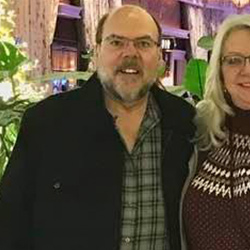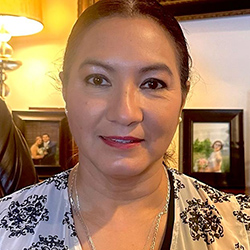Alzheimer’s Disease is challenging. It can be a life-changing diagnosis for both patients and their families, and our featured volunteer, Bart Brammer, knows that all too well. However, he encourages those with Alzheimer’s to not treat it as a death sentence but to make the best of the days they have left.
During a 2020 work trip in Wisconsin, Bart had a stroke. In seeking the origin of his stroke, his doctors diagnosed him with Alzheimer’s. Initially, Bart says that this discovery made him “shut down”. He had to stop traveling for work, he was confused, and, in his own words, “I just said, ‘Okay, I’m gonna die.’ ” It was his caregiver, Darlene, who encouraged him by saying, “You still got a lot of living to do.”
That was three years ago, and Bart says that Darlene was correct. Since then, Bart started volunteering with the Alzheimer’s Association. He has served on committees, given speeches, and speaks on behalf of those with Alzheimer’s. Currently, he is active with Vista Points, an organization that provides trusts to people with special needs.
Bart notes that we often hear about one’s journey with Alzheimer’s through the perspective of the caregiver, not the patient. “I’m being an active voice on that,” Bart says. Alzheimer’s is often discovered in its late stages where improvements cannot be made. As a person with early-onset Alzheimer’s, Bart has made it his mission to educate on and create awareness of the importance of catching Alzheimer’s early.
“So many times, Alzheimer’s is discovered late… They cannot make decisions. They cannot plan correctly, and sometimes the family is going to do things they might not want to do,” he says. When a patient gets a diagnosis early, they can make decisions for themselves for some time, before the family has to step in.
Bart also emphasizes that Alzheimer’s is nothing to be ashamed of. He has spoken to many patients who are afraid to tell their families and friends. In order to work through this denial, he says, “You don’t have to hide in the closet when you have Alzheimer’s. You need to let people know because sometimes you’re a little confused. Sometimes you’re argumentative.” Making an Alzheimer’s diagnosis known will make the journey easier for the patients and for their loved ones.
Finally, Bart notes that Alzheimer’s was discovered in 1918, but it is often dismissed as “getting old”. Bart believes that this may be the reason why a cure has yet to be discovered. If the attitude surrounding Alzheimer’s changed, Bart thinks he could’ve taken preventive measures earlier in life. This belief is made known through his volunteerism.
As a voice for people with Alzheimer’s, Bart has worked passionately to destigmatize the disability and show others that rather than steal their lives, a diagnosis can encourage them to give back with the time they have left. To learn more about Bart’s journey, listen to his interview on the Doing Good Podcast.




